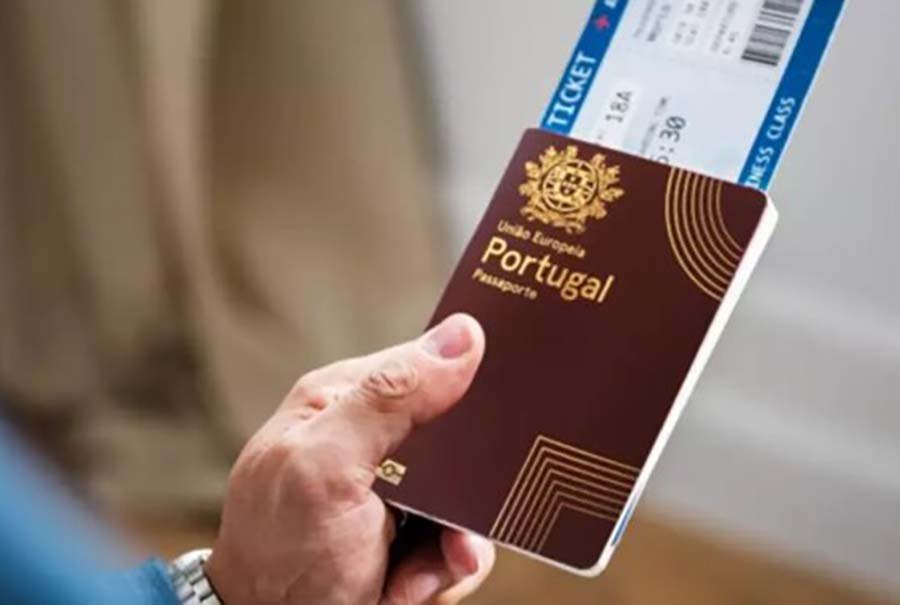Portugal Proposes to Extend Citizenship Waiting Period from 5 to 10 Years

Photo: Nairametrics
The Portuguese government has announced plans for a major reform of immigration legislation. The required period of legal residence to obtain citizenship may increase from 5 to 10 years, reports Nairametrics. Other changes for foreign nationals are also planned.
Prime Minister Luís Montenegro’s government included the draft law in a broader migration reform package promised upon taking office. Minister of the Presidency António Leitão Amaro stated that the reform aims to regulate migration inflows and make them more sustainable. Lisbon intends to attract skilled professionals, emigrants and their descendants, as well as investors.
The bill proposes extending the minimum residence requirement for citizenship to 10 years. Moreover, the waiting time between filing for a residence permit and its approval will no longer count towards this period, potentially delaying naturalization for thousands of migrants.
The reform also tightens family reunification rules, especially for non-EU citizens, who may be required to prove Portuguese language proficiency and financial independence. According to Amaro, the state services are overwhelmed and cannot cope with the growing number of new residents.
According to Pordata, 141,300 foreigners obtained Portuguese passports in 2023 – 20% fewer than in 2022. In January 2025, the government reported 400,000 pending applications; by mid-2025, the number had surpassed 700,000. In a country of 10.5 million residents, over 1.5 million are foreigners, including more than 450,000 Brazilians.
The Union of Registry and Notary Workers (STRN) links the surge in applications to fears of stricter laws, worsening existing system bottlenecks. Applications are submitted both online through lawyers and in person at registry offices, further straining staff already facing a 40% workforce shortage. The union estimates 266 registrar vacancies, with another 120 trainees not entering service until late 2026. Additionally, there is a shortfall of over 1,800 registry employees. A recent competition to fill 240 positions ended with only half filled due to poor working conditions. Regular retirements add further pressure.
Technological issues compound the staffing crisis. The IT platform for citizenship applications, launched under the Recovery and Resilience Plan, has suffered persistent malfunctions and has not been integrated with the Agency for Integration, Migration and Asylum for over a year. This “perfect storm” of staff shortages, technical failures, and surging demand has led to unprecedented backlogs and declining service quality.
The Institute of Registries and Notaries (IRN) has reached what the union calls a “chaotic and unprecedented” state. Some offices have even temporarily closed. In response, Justice Minister Rita Alarcão Júdice announced a tender for 400 new positions in May, alongside reforms to career progression. Yet unions warn that meaningful improvements will take years due to training requirements.
According to Global Citizen Solutions, on July 25, 2025, the president referred the bill to the Constitutional Court, which on August 8 declared several provisions unconstitutional. The proposal was returned to parliament for revision. The suggested increase from five to ten years applies to most foreigners, but citizens of CPLP (Community of Portuguese Language Countries) would face a seven-year threshold. CPLP includes nine Portuguese-speaking nations: Portugal, Brazil, Angola, Mozambique, Cape Verde, São Tomé and Príncipe, Guinea-Bissau, East Timor, and Equatorial Guinea.
The new law also proposes counting residence from the issuance date of the first residence permit, not the application date. Other requirements include proof of language at A2 level, passing a Portuguese culture and history test, and no criminal record. Job-seeker visas would be restricted to skilled professionals only.
The Constitutional Court blocked a planned two-year waiting period before family reunification applications, except for highly skilled professionals and investors, reports Reuters. The bill had also sought to abolish CPLP family reunification benefits, but this clause was removed.
Parliament will resume debate in September. The ruling coalition and its ally Chega, who pushed the initiative, must now adjust the bill to meet constitutional standards. The reform could impact tens of thousands of migrants and reflects both Europe’s broader political shift to the right and the tightening of migration policy. Left-wing parties criticized the plan as inhumane and rights-violating, while the government insists restrictions are necessary.
Подсказки: Portugal, citizenship, immigration, migration reform, CPLP, Europe, law, passport, residency, politics








